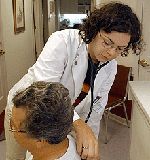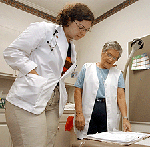SCRIPT provides hands-on experience for student
by Eddie LitakerItem Staff Writer
Petra Gheraibeh, a second-year student at the College of Medicine, will approach her studies this month with a keener understanding.
She, along with 15 other health profession students, completed a five-week program that gave them an opportunity to experience the rigors and challenges of practicing medicine in a rural setting. The South Carolina Rural Interdisciplinary Program of Training (SCRIPT) placed the students not only with Dr. Kate Smith in Turbeville, where Gheraibeh spent most of her time, but also with other health care professionals in Clarendon, Williamsburg and lower Florence counties.
Smith, who has been doing “everything” in her practice since 1965, has supported SCRIPT for each of the three years the program has had a presence in Clarendon County and said it is always exciting to have the students assisting in her office.
“It’s fun, especially when they’re eager to learn, and maybe they get a little bit of actual clinical practice in, but most of them are very well prepared academically, so you don’t teach them a whole lot of that,” Smith said. “Mainly, it’s beginning to see something that they have learned. The main thing is if we could entice some of them (into seeing) that this is what they wanted to do. The purpose of the program is to show what happens in rural areas and try to get them to come back to an area that is underserved, but we don’t have many missionaries anymore.”
Smith and Gheraibeh agreed that this program— which is sponsored by Area Health Education Centers through a grant funded by the U.S. Bureau of Health Professions, Health Resources and Services Administration and The Robert Wood Johnson Foundation—is beneficial for the young medical students as they decide what career path to take.
“They can see what it really is like in the trenches when they get to see the patients and talk to them,” Smith said. “Quite often, though, they decide this is not what they want to do. They want an easier life.”
 Medical
student Petra Gheraibeh examines a patient at Dr. Kate Smith's practice
in Turbeville.
Medical
student Petra Gheraibeh examines a patient at Dr. Kate Smith's practice
in Turbeville.
“I think it’s very important, especially for the students who have not grown up in a rural area,” Gheraibeh said. “I have (grown up in a rural area) and my father is a practicing physician, and we have always worked in a rural town, so I kind of knew what I was getting into. But a lot of the students who are in the program may not. They’ve lived in Charleston or a large city all their lives. I think it’s a great experience, and I think the program is very important.”
Smith said surveys have shown that medical students who grow up in small
towns are more likely to end up working in a rural setting. Gheraibeh said
her
father, Jeff, who is Jordanian and came to the United States about
30 years ago to begin his medical practice, did his residency at Columbia’s
Richland Memorial Hospital. The family then moved to a small town in Mississippi,
where her father practiced for 17 years. After that, the family moved to
a small town in Missouri for three years before moving back to Florence.
Her father now practices in Lake City.
Smith and Gheraibeh each said that working together for the past month has been a pleasure.
“It’s been fun having her,” Smith said. “She’s fit right in with the staff. They have just adopted her. ”
“It’s been a wonderful experience,” Gheraibeh said. “I’ve learned a lot, as far as the practical side of medicine goes, just getting the hands-on experience. They teach us in school how to listen to the heart, how to listen to the lungs, and they even have CDs where we can listen to the sounds and see what they’re supposed to sound like, but it’s not the same as actually listening to a patient. You learn about all of these different disorders, and then when you actually hear one, you’re like, ‘Oh my gosh, that’s what that sounds like!’, and then you know and it’s etched in your brain and you’ll never forget it. ... It’s a good way to remind you of why you’re in school when you’re studying all of the books. It’s a nice refresher.”
 Petra
Gheraibeh, left, and Dr. Kate Smith look at a patient's chart.
Petra
Gheraibeh, left, and Dr. Kate Smith look at a patient's chart.
Gheraibeh has been able to sit in on doctor-patient interviews, listen to hearts and lungs, observe checkups, give allergy shots and, under supervision, draw blood. She has also assisted Smith on some mole removals and skin cancer removals and has talked with some of the drug representatives who visit the office.
And when Smith was at a conference in Myrtle Beach two weeks ago, Gheraibeh was able to work with another physician.
“I went to the operating room in Manning because we had hospital orientation, and they told us if we wanted to observe any procedures that we could go up there and do that, so I went up there for a day and watched some EGDs and colonoscopies,” Gheraibeh said. “Then I went to Lake City and actually helped my father in his office. I’ve always hung around him, and that’s how I was exposed to medicine, I guess, so it’s interesting now that I’ve actually started medical school. Now I understand what he’s talking about, so we treat each other with a different kind of respect and regard now. Medical school has been a good bonding experience for me and my father.”
Gheraibeh said that working with Smith would convince any medical student that a career in rural medicine is worth considering.
“She draws patients from towns all over, not just Turbeville,” Gheraibeh said. “People come from Florence, Lake City, Manning, so she really has a good draw. People trust her because she’s been here for so long, and she is such a wonderful doctor. She really, really cares about her patients, and they know that about her. I would think if anybody is entertaining the idea of practicing in a rural area, they should come and work with Dr. Smith because she’d definitely convince them.”
Gheraibeh said the reception she has received from Smith’s staff and patients has been heartwarming.
“I have been received wonderfully,” Gheraibeh said. “The staff here is wonderful. Everybody is very nice, very energetic, they love their jobs, and we all have a great time. The patients have been very receptive, and I think it’s been nice for them to see somebody young come in and show an interest in the practice. It’s been more than I expected. I didn’t think I was going to have this wonderful of a time and learn this much in such a short period of time.”
With a recent change in the rural family medicine rotation, instead of four weeks, students now must complete eight weeks of rural medicine practice, so Gheraibeh said she is looking forward to possibly coming back to Turbeville in a year or two for more work with Smith.
Editor's note: The article ran Aug. 12 in The Item, Sumter, S.C.,
and is reprinted with permission. Photos by Keith Gedamke, The Item.
Catalyst Online is published weekly, updated as
needed and improved from time to time by the MUSC Office of Public Relations
for the faculty, employees and students of the Medical University of South
Carolina. Catalyst Online editor, Kim Draughn, can be reached at 792-4107
or by email, catalyst@musc.edu. Editorial copy can be submitted to Catalyst
Online and to The Catalyst in print by fax, 792-6723, or by email to petersnd@musc.edu
or catalyst@musc.edu. To place an ad in The Catalyst hardcopy, call Community
Press at 849-1778.